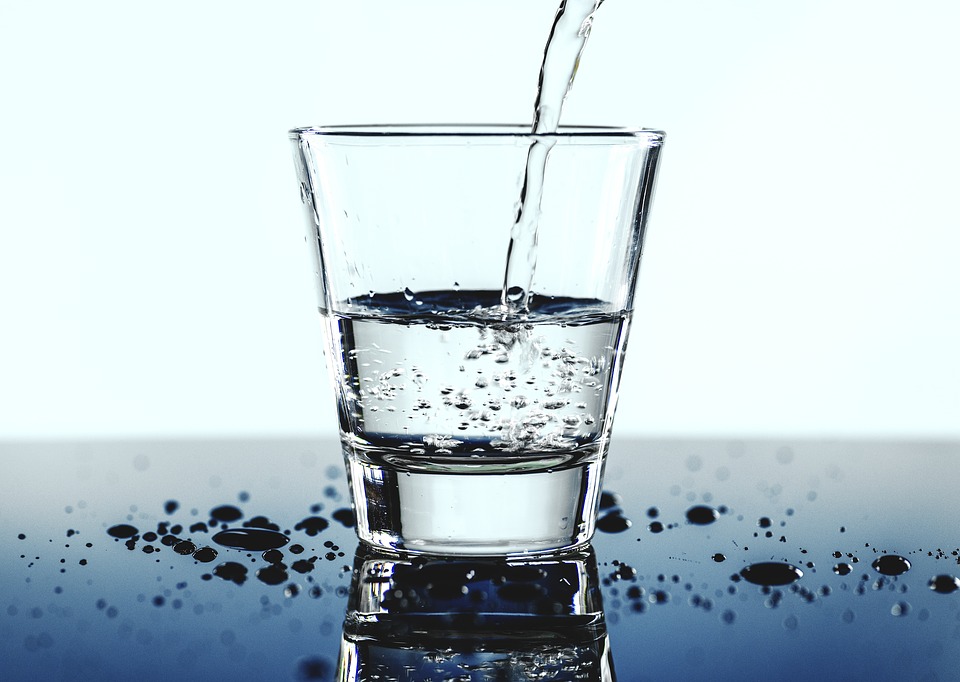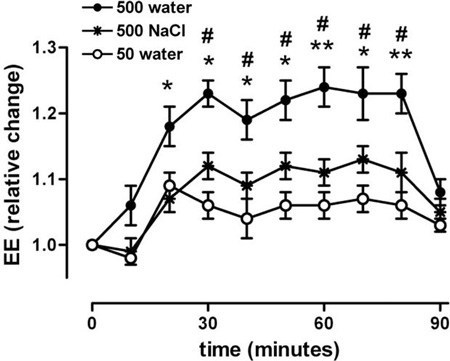The body is about 60% water, give or take.
You are constantly losing water from your body, primarily via urine and sweat. To prevent dehydration, you need to drink adequate amounts of water.
There are many different opinions on how much water you should be drinking every day.
Health authorities commonly recommend eight 8-ounce glasses, which equals about 2 liters, or half a gallon. This is called the 8×8 rule and is very easy to remember.
However, some health gurus believe that you need to sip on water constantly throughout the day, even when you’re not thirsty.
As with most things, this depends on the individual. Many factors (both internal and external) ultimately affect your need for water.
This article takes a look at some water intake studies to separate fact from fiction and explains how to easily match water intake to your individual needs.
Does Water Intake Affect Energy Levels and Brain Function?
Many people claim that if you don’t stay hydrated throughout the day, your energy levels and brain function start to suffer.
And there are plenty of studies to support this.
One study in women showed that a fluid loss of 1.36% after exercise impaired mood and concentration and increased the frequency of headaches.
Other studies show that mild dehydration (1–3% of body weight) caused by exercise or heat can harm many other aspects of brain function.
Keep in mind that just 1% of body weight is a fairly significant amount. This happens primarily when you’re sweating a lot.
Mild dehydration can also negatively affect physical performance, leading to reduced endurance.
Mild dehydration caused by exercise or heat can have negative effects on both your physical and mental performance.
Does Drinking a Lot of Water Help You Lose Weight?

There are many claims that increased water intake may reduce body weight by increasing your metabolism and reducing your appetite.
According to two studies, drinking 17 ounces (500 ml) of water can temporarily boost metabolism by 24–30%.
The image below shows this effect. The top line shows how 17 ounces (500 ml) of water increased metabolism. Notice how this effect decreases before the 90-minute mark.

The researchers estimated that drinking 68 ounces (2 liters) in one day increased energy expenditure by about 96 calories per day.
Additionally, it may be beneficial to drink cold water because your body will need to expend more calories to heat the water to body temperature.
Drinking water about a half-hour before meals can also reduce the number of calories you end up consuming, especially in older individuals.
One study showed that dieters who drank 17 ounces (500 ml) of water before each meal lost 44% more weight over 12 weeks, compared to those who didn’t.
Overall, it seems that drinking adequate amounts of water, particularly before meals, may have a significant weight loss benefit, especially when combined with a healthy diet.
What’s more, adequate water intake has a number of other health benefits.
- Losing as little as 2% of your body’s water content can significantly impair physical performance.
- Mild dehydration (fluid loss of 1-3%) can impair energy levels and mood, and lead to major reductions in memory and brain performance.
- Drinking water can sometimes help relieve headache symptoms, especially in people who are dehydrated.
- Drinking plenty of water can help prevent and relieve constipation, especially in people who generally do not drink enough water.
- Increased water intake appears to decrease the risk of kidney stone formation. More research is needed in this area.
- Hangovers are partly caused by dehydration, and drinking water can help reduce some of the main symptoms of hangovers.
- Drinking More Water Can Help With Weight Loss
Drinking water can cause mild, temporary increases in metabolism, and drinking it about a half hour before each meal can make you automatically eat fewer calories. Both of these effects contribute to weight loss.
Does More Water Help Prevent Health Problems?
Several health problems supposedly respond well to increased water intake:
- Constipation: Increasing water intake can help with constipation, a very common problem
- Cancer: Some studies show that those who drink more water have a lower risk of bladder and colorectal cancer, although other studies find no effect.
- Kidney stones: Increased water intake may decrease the risk of kidney stones.
- Acne and skin hydration: There are a lot of anecdotal reports about how water can help hydrate the skin and reduce acne. So far, no studies have confirmed or refuted this.
Drinking more water may help with some health problems, such as constipation and kidney stones, but more studies are needed.
Do Other Fluids Count Toward Your Total?
Plain water is not the only drink that contributes to your fluid balance. Other drinks and foods can have a significant effect.
One myth is that caffeinated drinks, such as coffee or tea, don’t help you hydrate because caffeine is a diuretic.
In fact, studies show that the diuretic effect of these beverages is very weak.
Most foods are also loaded with water. Meat, fish, eggs and especially fruits and vegetables all contain significant amounts of water.
19 Water-Rich Foods That Help You Stay Hydrated
- Watermelon is a hydrating, nutrient-dense fruit that may provide several health benefits, including a reduced risk of chronic illness.
- Strawberries are very healthy and contain lots of water. Plus, the nutrients they provide may deliver a number of health benefits.
- Cantaloupe is a healthy fruit that provides a significant amount of water and many health-promoting vitamins and minerals.
- Peaches are rich in water, fiber and antioxidants, in addition to several vitamins and minerals that may promote hydration and provide many other health benefits.
- Oranges are a great source of water, fiber, antioxidants and several nutrients and may help prevent kidney stones and several illnesses.
- Milk is rich in water, vitamins and minerals, and has been shown to help people maintain proper hydration, especially after exercise.
- Cucumbers are high in water but very low in calories. This combination is beneficial for several aspects of your health, including hydration.
- Lettuce provides a few important nutrients and fiber, as well as a high amount of water, which may help keep you hydrated.
- Broths and soups are rich in water and therefore excellent foods to include in your diet to promote hydration.
- Consuming zucchini will contribute a significant amount of water and nutrients to your diet. It will help keep you hydrated, and it’s beneficial for your overall health.
- Celery is low in calories and an excellent source of water and nutrients. These properties can promote several aspects of your health, including proper hydration.
- Plain yogurt is a great source of water, protein and some important vitamins and minerals. It may provide hydrating effects, along with many other health benefits.
- Tomatoes provide lots of water, nutrients and antioxidants, which are beneficial for hydration and protect against several diseases.
- Bell peppers may provide a number of health benefits due to the high amounts of water and nutrients they contain, particularly vitamin C.
- Cauliflower provides a significant amount of water, fiber and nutrients, and it’s a good substitute for grains that are less hydrating.
- Eating cabbage may help several aspects of your health, including hydration. This is due to its water, nutrient and antioxidant contents.
- Grapefruit may promote hydration due to its high water content. It’s also rich in nutrients and antioxidants that may have a number of health benefits.
- Drinking coconut water is especially helpful for hydration because it’s rich in water and electrolytes.
- Cottage cheese contains lots of water and protein, in addition to vitamins and minerals that may provide health benefits.
Together, coffee or tea and water-rich foods can help maintain your fluid balance.
Trust Your Thirst — It’s There for a Reason
Maintaining water balance is essential for your survival.
13 Easy Ways to Lose Water Weight (Fast and Safely)
- Regular exercise can help you maintain a natural balance of body fluids and sweat out excess stored water.
- A good night’s sleep may help your body manage its fluid and sodium balance and lead to reduced water weight in the long term.
- Stress increases cortisol and the antidiuretic hormone (ADH), which directly affect your body’s water balance.
- Electrolytes control water balance and cell hydration. Electrolyte supplements can be beneficial if you drink a lot of water, exercise a lot, live in a hot climate or don’t eat salty foods.
- Salt or sodium plays a key role in fluid balance. Try to avoid extreme changes, such as excessive salt intake or the elimination of salt.
- Magnesium intake should be optimized, as it plays a key role in hydration levels and body water content.
- Dandelion is a popular herb often used by bodybuilders and athletes who need to lose water weight.
- Dehydration or over-hydration can lead to water retention. Make sure to drink balanced amounts of water each day.
- Certain foods and herbs can act as diuretics and reduce water retention. Combine them with easily digestible foods that don’t cause bloating or intolerances.
- A low-carb diet can cause a rapid decrease in water weight because of reduced glycogen stores and lower insulin levels.
- Moderate amounts of caffeine from coffee, tea or caffeine supplements may help you drop excess water.
- Avoid eating excessive amounts of processed foods, salt and caffeine and limit your alcohol consumption.
- When looking into diuretic medication or pills, consult with a medical practitioner and take prescribed drugs under supervision.
For this reason, your body has a sophisticated system for regulating when and how much you drink.
When your total water content goes below a certain level, thirst kicks in.
This is controlled by mechanisms similar to breathing — you don’t need to consciously think about it.
For the majority of people, there probably isn’t any need to worry about water intake. The thirst instinct is very reliable.
There really is no science behind the 8×8 rule. It is completely arbitrary.
That said, certain circumstances may call for increased water intake.
The most important one may be during times of increased sweating. This includes exercise and hot weather, especially in a dry climate.
If you’re sweating a lot, make sure to replenish the lost fluid with water. Athletes doing very long, intense exercises may also need to replenish electrolytes along with water.
Your water need also increases during breastfeeding, as well as several disease states like vomiting and diarrhea.
Furthermore, older people may need to consciously watch their water intake because the thirst mechanisms can start to malfunction in old age.
Most people don’t need to consciously think about their water intake, as the thirst mechanism in the brain is very effective. However, certain circumstances do call for increased attention to water intake.
How Much Water Is Best?
At the end of the day, no one can tell you exactly how much water you need. This depends on the individual.
Try experimenting to see what works best for you. Some people may function better with more water than usual, while for others it only results in more frequent trips to the bathroom.
If you want to keep things simple, these guidelines should apply to the majority of people:
- When you’re thirsty, drink.
- When you’re not thirsty anymore, stop.
- During high heat and exercise, make sure to drink enough to compensate for the lost fluids.
- That’s it!